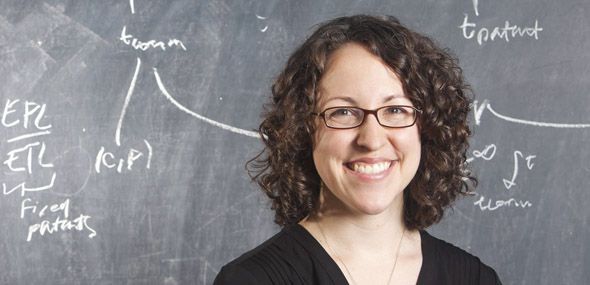THE HUMAN FACTOR
Solving the political, cultural, economic dimensions of global issues
Interview with Heidi Williams
Unraveling the economic and policy forces that hinder or spur medical innovation

About The Human Factor Series
MIT is working to advance solutions to major issues in energy, education, the environment, and health. For example: How can we reduce morbidity and mortality in cancer cases? How can we halve carbon output by 2050? How can we provide quality education to all people who wish to learn?
As the editors of the journal Nature have said, framing such questions effectively — incorporating all factors that influence the issue — is a key to generating successful solutions. Science and technology are essential tools for innovation, and to reap their full potential, we also need to articulate and solve the many aspects of today’s global issues that are rooted in the political, cultural, and economic realities of the human world.
The Human Factor Series highlights research and perspectives on the human dimensions of global challenges and nd share ideas for cultivating the collaborations needed to solve the major civilizational issues of our time.
__________
Heidi Williams is the Class of 1957 Assistant Professor in the Department of Economics. The winner of a 2015 MacArthur Foundation “genius” grant, she researches the causes and consequences of technological change in health-care markets. As part of the 2015 MIT SOLVE conference, Williams participated in a thought-leadership speaker series sponsored by Google on the topic “Reinventing Healthcare.” MIT-SHASS Communications asked her to share her thoughts on the role of economics in meeting global healthcare challenges.
Q: As MIT President Reif has said, solving the great challenges of our time will require multidisciplinary problem-solving — bringing together expertise and ideas from many fields. Can you share why you believe it is critical for any effort to address the world’s health-care needs to incorporate tools and perspectives from the field of economics?
Williams: What I think is really exciting about the field of economics is that we have the opportunity to provide rigorous scientific evidence on questions that we need answers to in order to improve the design of public policies.
In the basic sciences and in the field of medicine, researchers are able to conduct randomized controlled trials in order to uncover the answers to questions of interest, like whether aspirin can prevent cancer. In the social sciences, we have many important questions, but it can be harder to conduct credible studies to arrive at clear answers. As an example from my own work, I would like to know whether longer patent terms would incentive additional private research investments and what the value of those additional research investments would be for consumers. But — at least so far! — no one has offered to let me conduct a randomized trial that would award longer patent terms to e.g. the developers of drugs to treat some diseases but not others.
So, instead, as an economist I look for ways of constructing data sets and designing empirical strategies that can mimic a randomized experiment, in order to try to uncover answers to these types of questions. More generally, I think economics has an important perspective to offer in terms of clear analysis of market failures — situations where the market, in the absence of government intervention, will produce a socially suboptimal outcome — and in thinking about how best to design public policies to address market failures.
Q: What is the barrier to increased multidisciplinary collaboration — and how do we overcome it?
Williams: Overall, I think that patience and a willingness to be open-minded are probably the most important inputs into cross-disciplinary collaborations.

Williams' research shows that relatively simple policy changes, along with tweaks to the R&D pipeline, could help create more drugs for cancer prevention, and for treating cancers at earlier stages.
Q: The MIT SOLVE conference asked four questions related to leveraging innovations in health-care delivery and medical research to make care affordable and universally available. What has your extensive experience as an innovation economist working on health-care markets taught you that can help us address these questions?
Williams: Much of my research investigates cases where there are disconnects between the private incentives to invest in certain types of medical technologies and the social contributions of those technologies.
One specific example is a recent paper I have written with Eric Budish from the Chicago Booth School of Business and Ben Roin from MIT Sloan. We investigate whether there are too few incentives for private firms to develop drugs to treat early-stage cancers or to prevent cancer, relative to the incentives we provide for private firms to develop drugs to treat late-stage cancers.
Before new drugs can enter the market, manufacturers must show the government evidence from randomized clinical trials that their drug improves the survival outcomes of patients. Because survival improvements can be statistically established much more quickly in cases where patients have worse survival prospects, the clinical trials for late-stage cancers (which have higher mortality rates) tend to be shorter than the clinical trials for early stage cancers. It also turns out that because patents are almost always filed prior to starting clinical trials, we effectively award longer patent terms to drugs that complete clinical trials more quickly — with late-stage cancer drugs providing a key example.
The empirical analysis in our paper provides evidence on the magnitude and consequences of this distortion, which — we estimate — has quantitatively important impacts not only on which cancer drugs get developed, but also on the survival outcomes of cancer patients. The natural follow-on question is then: What can be done about that? In our paper, we examine several policy levers that could be used to address this distortion.

"A key challenge is to identify missed opportunities in health-care innovation and to redesign public policies to avoid those missed opportunities."
Q: What questions do you think need to be articulated to make progress toward MIT’s health goals? In particular, what economic, sociopolitical, and/or cultural issues do you think need to be addressed?
Williams: From my perspective as an economist who works on innovation issues, I think a key challenge is to try to identify “missed opportunities” in health-care innovation and to try to redesign public policies to avoid those missed opportunities.
What I mean by that is the following. If a candidate pharmaceutical drug doesn’t benefit patients, we can “see” that because we do randomized clinical trials of drugs and can observe that a candidate drug compound is no better than (or is worse than) a placebo. In that sense, the costs and benefits of new drugs are feasible to measure. However, when you think about the complex system of incentives that are in place to bring novel ideas from a scientific lab to a patient’s bedside, there are many ways in which things can go wrong, but the costs of misaligned incentives are much harder to measure.
If you talk with medical researchers or basic scientific researchers, you will often hear them talk about scientifically feasible projects that they think held the potential to really benefit patients, but which never received the resources necessary to be brought to market. I think of these projects as missed opportunities — technologies that could have existed, and which may have had benefits for patients, but which for whatever reason were never pursued.
If a candidate drug fails because we find out it is not very efficacious, that is a good outcome; but if a candidate drug is never pursued because e.g. some unintended aspect of the patent system means that developing that drug will never be profitable, that is a missed opportunity that policy changes could aim to address.
The reason why I think this area is so important is because the costs of these missed opportunities are largely invisible — no one keeps a list of drugs that could have been developed (in the sense of being scientifically feasible) but never reached patients. But the social costs of these missed opportunities are potentially quite large, and relatively simple policy changes may be able to generate large improvements in patient health and the productivity of the health-care system more broadly.
Suggested Links
MIT Department of Economics
Video: Reinventing HealthCare
Heidi Williams in a SOLVE Talks at Google conversation
Paper: Do Firms Underinvest in Long-Term Research
Heidi Williams wins MacArthur "genius grant"
Study: Firms underinvest in long term cancer research
Why it happens, and how tweaks to the R&D pipeline could create new drugs and greater social benefit
Interview prepared by SHASS Communications
Human Factor Series Editor: Emily Hiestand, Communications Director
Writing Team: Kathryn O'Neill, Emily Hiestand
Published 14 November 2015